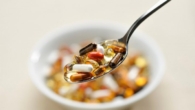
They do not make you fat: common mistakes about calories
0
The calorie content of foods indicates any -which label, but not everyone knows what it means. For example, when indicating the energy value of food, kilocalories are written on the product packaging, not calories. These concepts are often confused.
A calorie is the amount of heat used to heat a gram of water by 1°C. And this is a small amount of energy. Yes, 1 g of sugar contains about 3,870 calories – a huge number, which is why kilocalories are printed everywhere on labels. What other mistakes about calorie content provoke a wrong attitude to the diet?
Calories are not contained in food
Calories are a unit of heat energy measurement. Like any unit of energy, it cannot be “in” or “on”. The correct phrase is “calorie content of food”. It is understood as the ability of food to give energy to the body.
Calories do not make you fat
The increase in excess weight is due to the fact that the body receives excess food, and with it – energy that is not needed for everyday activities. Calories in themselves do not affect this, because you get fat from excess proteins, fats and carbohydrates, which turn into subcutaneous fat. With a less active lifestyle, the number of “reserves” increases, and excess body weight increases.
Calories cannot be burned
“Burn calories” is a figurative expression, a calorie by definition cannot be eliminated in this way. From the point of view of biochemistry, the process of “drying” in the gym looks like the oxidation of fats and proteins accumulated by the body, and “burning” is a separate case of oxidation. “Losing excess weight” or “burning excess weight” are correct terms.
Nutritional value is not measured in calories
Most often it is believed that the calorie content of food is nutritional value. However, in reality, caloric content means the energy value of food. The nutritional value is determined by the composition of proteins, fats, carbohydrates, trace elements, and in some cases – vitamins and amino acids.









Leave a Reply